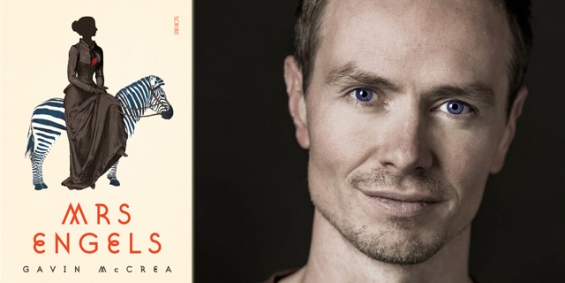Author Spotlight: Gavin McCrea
17th June, 2016
We asked Gavin McCrea some questions about his novel Mrs Engels. Here are his answers.
What do you think about being shortlisted for the Walter Scott Prize for Historical Fiction? Do you see yourself as a historical novelist?
It is a thrill and an honour and to be shortlisted for the Walter Scott Prize. Starting out as a writer, it can be hard to get attention for your work when there are so many established names producing excellent books. Hopefully this nomination will help to convince some readers to take a chance on a new voice.
In my view all novelists are historical novelists. All novels, whatever their temporal setting—be it the recent past, the distant past or indeed an imagined future—are necessarily, inescapably historical. Fiction cannot claim to grasp the present; it can only be about what is over. Nor can fiction presume to see into the future; it must look back in order to speculate about what might come next. Some novels are set in earlier times than others, yet there is no novel that is more historical than another.
Having said that, I embrace the Walter Scott Prize as an acknowledgement of an important facet of our (necessarily historical) literary culture: the telling of stories set in a more distant past. While it would be hard to claim that the Prize’s ‘60-year rule’ is anything but arbitrary, it is also true that thanks to this rule the Prize can call attention to works that might otherwise be overlooked in our scramble for what appears to be ‘new’ or ‘of the now’; works which examine more remote moments in history in an effort to make renewed sense of the ever-changing relationship between private memory and public record; works which remind us that what we believe ourselves to have been, we are.
Which is all to say: every prize must have its parameters, and I am delighted that my novel fits into those of the Walter Scott Prize.
How did the people and times you write about in this novel first lodge in your imagination?
Since 2008 I have observed with interest the events of the global financial crisis and the ensuing debates about growing inequalities in the capitalist system. I wanted my first novel to respond in some way to this crisis. I did not know what form this response would take, however, until in 2010 I came across the figure of Lizzie Burns (d.1878), the poor Irish lover of the communist philosopher, Friedrich Engels.
I came across Lizzie in a biography of Engels. It was a chance meeting. Indeed, it was barely a meeting at all. Lizzie was illiterate and left no diaries or letters of her own, so there is not much known about her. A ghost in the record, she wafts in and out of rooms dominated by the great hulks of Engels and his friend Karl Marx. Yet despite, or perhaps because of her lack of historical weight, I knew instantly that she would be my subject. Lizzie would be my eyes on the first communists as they struggled to reconcile their ideals with their own private circumstances. Through her, and through her views of them, I would be able to explore my own conflicted attitudes to capitalism today.
What role does research have in your writing? When does the fiction take over from the facts?
My reading for Mrs Engels ranged widely, from literature to history to biography to theory. The largest portion of my research, however, related to 19th-century domestic life: cultural histories, photos, drawings, advertisements, maps, guidebooks and so on. My aim when studying the Victorian domestic space was to set the limits for what my characters were capable of doing and thinking within that space. Would it occur to a particular character to take this or that action in this or that room? Would a certain action be ‘thinkable’ in a certain location? If so, what form would that action take? How would that action look? What objects or gestures would be employed?
For me research is about setting the bounds within which my characters act and against which they struggle. It is about setting the rules for their thoughts and behaviour, and exploring what happens when they breach those rules.

